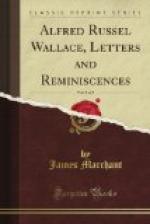My dear Mr. Wallace,—I have been reading over again your paper published in 1855 in the Annals on “The Law which has regulated the Introduction of New Species”; passages of which I intend to quote, not in reference to your priority of publication, but simply because there are some points laid down more clearly than I can find in the work of Darwin itself, in regard to the bearing of the geological and zoological evidence on geographical distribution and the origin of species. I have been looking into Darwin’s historical sketch thinking to find some allusion to your essay at page xx., 4th ed., when he gets to 1855, but I can find no allusion to it. Yet surely I remember somewhere a passage in which Darwin says in print that you had told him that in 1855 you meant by such expressions as “species being created on the type of pre-existing ones closely allied,” and by what you say of modified prototypes, and by the passage in which you ask “what rudimentary organs mean if each species has been created independently,” etc., that new species were created by variation and in the way of ordinary generation.
Your last letter was a great help to me, for it was a relief to find that the Lombok barrier was not so complete as to be a source of difficulty. I have also to thank you for your papers, one of which I had read before in the Natural History Review, but I am very glad of a separate copy. I am rather perplexed by Darwin speculating on the possibility of New Zealand having once been united with Australia (p. 446, 4th Ed.). The puzzle is greater than I can get over, even looking upon it as an oceanic island. Why should there have been no mammalia, rodents and marsupials, or only one mouse? Even if the Glacial period was such that it was enveloped in a Greenlandic winding-sheet, there would have been some Antarctic animals? It cannot be modern, seeing the height of those alps. It may have been a set of separate smaller islands, an archipelago since united into fewer. No savages could have extirpated mammalia, besides we should have found them fossil in the same places with all those species of extinct Dinornis which have come to light. Perhaps you will say that the absence of mammalia in New Caledonia is a corresponding fact.
This reminds me of another difficulty. On the hypothesis of the coral islands being the last remnants of a submerged continent, ought they not to have in them a crowd of peculiar and endemic types, each rivalling St. Helena, instead of which I believe they are very poor [in] peculiar genera. Have they all got submerged for a short time during the ups and downs to which they have been subjected, Tahiti and some others having been built up by volcanic action in the Pliocene period? Madeira and the Canaries were islands in the Upper Miocene ocean, and may therefore well have peculiar endemic types of very old date, and destroyed elsewhere. I have just got in Wollaston’s “Coleoptera Atlantidum,” and shall be glad to lend it you when I have read the Introduction. He goes in for continental extension, which only costs him two catastrophes by which the union and disunion with the nearest mainland may readily be accomplished.... —Believe me ever most truly yours,




